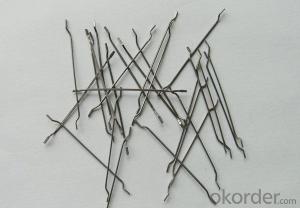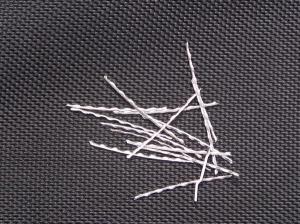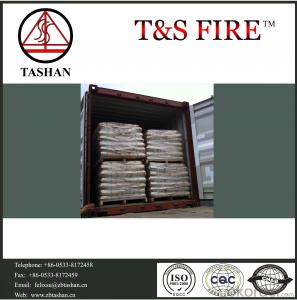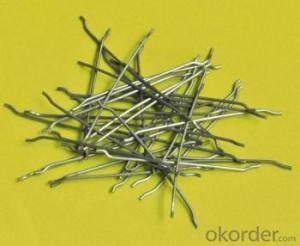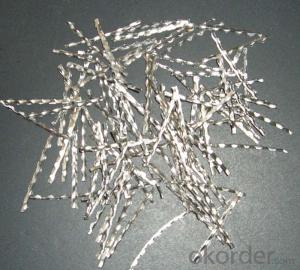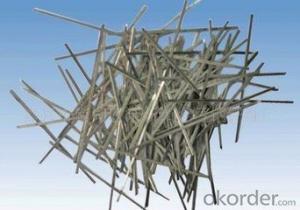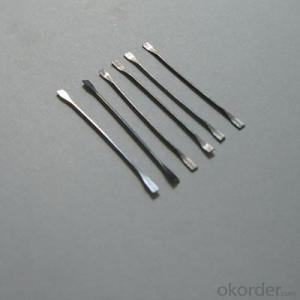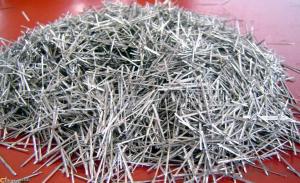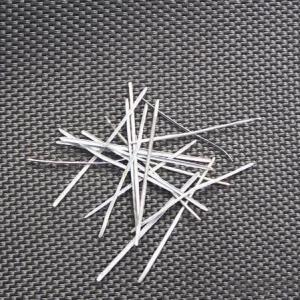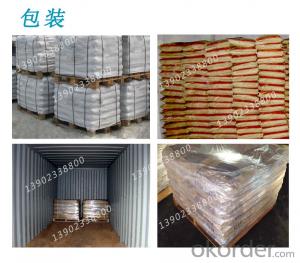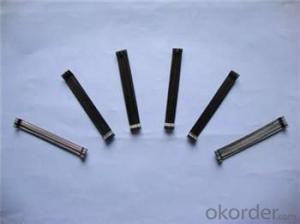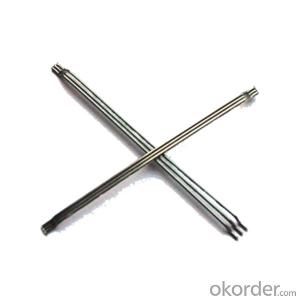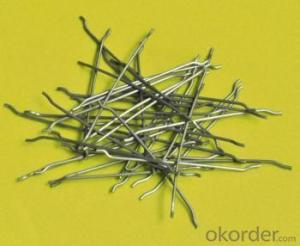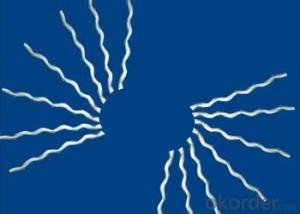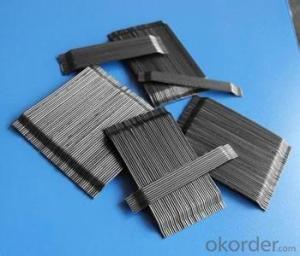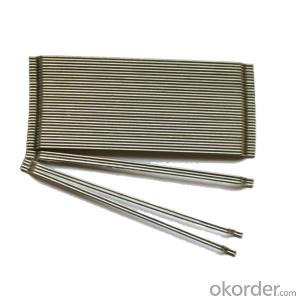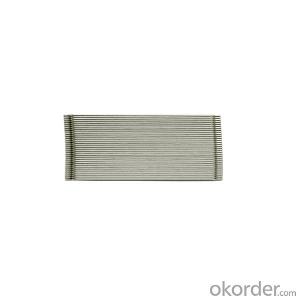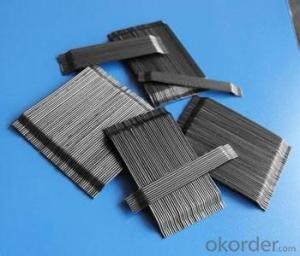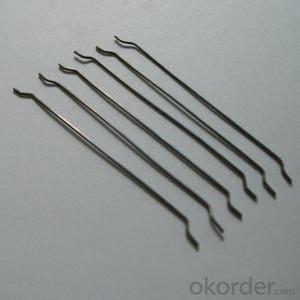Steel Fiber Straight Type From CNBM International China
- Loading Port:
- Tianjin
- Payment Terms:
- TT OR LC
- Min Order Qty:
- 1000 kg
- Supply Capability:
- 30000 kg/month
OKorder Service Pledge
OKorder Financial Service
You Might Also Like
Quick Details
Place of Origin: Jiangsu, China (Mainland)
Model Number: HT-ST
Material: Steel
Specifications
Micro steel fiber:
1.Material: low carbon steel wire,copper coated
Diameter:0.2mm --0.25mm
Length: 12mm-14mm
Tensile strength:>2850Mpa
2.Feature:Excellent tensile, bending and shearing strength, resistance against cracking, impact and fatigue.
3.Use:It is widely used for buildings, road surface, bridges, tunnels, airport road surface, water conservancy projects, military engineering, and all kinds of building products.
Specifications
1.Material: low carbon steel wire
2.Diameter: 0.2mm --0.25mm
3.Length: 12mm-14mm
4. ISO 9001 certificated
Hooked steel fiber:
1.Diameter:0.4mm-1.0mm
2.Length: 25mm-60mm
3.Material: low carbon steel wire
4.Feature: excellent tensile,high tenacity,against cracking,impact and fatigue
5.Uses: highway road surface,tunnel,building,airport road surface and so on .
Micro steel fiber:
1.Material: low carbon steel wire,copper coated
Diameter:0.2mm --0.25mm
Length: 12mm-14mm
Tensile strength:>2850Mpa
2.Feature:Excellent tensile, bending and shearing strength, resistance against cracking, impact and fatigue.
3.Use:It is widely used for buildings, road surface, bridges, tunnels, airport road surface, water conservancy projects, military engineering, and all kinds of building products.
Picture
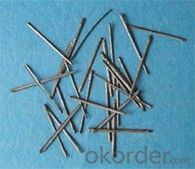
Steel fiber straight type
FAQ
Straight steel fiber:
1) Material: low carbon steel wire
2) Diameter: 0.4mm
3) Length: 18mm-35mm
4) Tensile strength: >1000Mpa
5) Feature: excellent tensile, high tenacity, against cracking, impact and fatigue
6) Uses: highway road surface, tunnel, building, airport road surface and so on.
- Q:What is the effect of melt extract stainless steel fiber on the permeability of shotcrete?
- The effect of melt extract stainless steel fiber on the permeability of shotcrete is to significantly reduce or eliminate the permeability altogether. Shotcrete is a construction material that is commonly used for applications such as tunnel linings, retaining walls, and slope stabilization. Permeability refers to the ability of a material to allow the passage of fluids or gases through its pores or cracks. When melt extract stainless steel fibers are added to shotcrete, they create a dense network within the material. This network acts as reinforcement and helps to improve the overall strength and durability of the shotcrete. Additionally, the stainless steel fibers fill any voids or cracks in the shotcrete, reducing its permeability and preventing the ingress of water, gases, or other substances. The melt extract stainless steel fibers also enhance the cohesion and bonding of the shotcrete, improving its resistance to cracking and spalling. This is particularly beneficial in applications where the shotcrete is exposed to harsh environmental conditions or high levels of moisture. Overall, the addition of melt extract stainless steel fibers to shotcrete has a positive effect on its permeability, making it a more reliable and durable construction material. This improvement in permeability helps to enhance the performance and lifespan of shotcrete structures, ensuring their long-term integrity and functionality.
- Q:How does melt extract stainless steel fiber improve the crack width control in concrete?
- Melt extract stainless steel fiber is a type of reinforcement that is added to concrete to improve its crack width control. The addition of these fibers helps to distribute the stress and load more evenly throughout the concrete, preventing the formation and propagation of cracks. One of the main benefits of melt extract stainless steel fiber is its ability to increase the flexural strength of concrete. This means that it can withstand higher loads and stresses without cracking. The fibers act as tiny reinforcements, bridging the cracks that may form in the concrete and preventing them from widening. Additionally, the melt extract stainless steel fibers are highly resistant to corrosion, which is a common problem in concrete structures. Corrosion can lead to the expansion of steel reinforcement, causing cracks to form in the concrete. By using stainless steel fibers, the risk of corrosion-related cracking is significantly reduced. Furthermore, the presence of melt extract stainless steel fibers in concrete improves its durability and longevity. The fibers enhance the overall toughness of the concrete, making it more resistant to impact, abrasion, and fatigue. This, in turn, helps to control crack width by minimizing the damage caused by external forces. In summary, melt extract stainless steel fiber improves crack width control in concrete by enhancing its flexural strength, reducing the risk of corrosion-related cracking, and increasing its durability. By preventing cracks from widening and minimizing the formation of new cracks, these fibers contribute to the overall integrity and longevity of concrete structures.
- Q:Can melt extract stainless steel fiber be used in foundation slabs?
- Yes, melt extract stainless steel fiber can be used in foundation slabs. These fibers provide reinforcement and improve the overall strength and durability of the concrete. They are commonly used in industrial and commercial applications where heavy loads and high traffic are expected. The stainless steel fibers are resistant to corrosion and can withstand harsh environmental conditions. They also help to control cracking and improve the overall performance of the foundation slab.
- Q:How does melt extract stainless steel fiber enhance the resistance to impact loads in concrete?
- The resistance to impact loads in concrete is enhanced by melt extract stainless steel fiber, which possesses unique properties and behavior. When incorporated into concrete, stainless steel fibers disperse evenly throughout the mixture, forming a three-dimensional reinforcement network. This network functions as a secondary reinforcement system, augmenting the concrete's capacity to withstand impact loads. The impact resistance is greatly improved by the high tensile strength and ductility of stainless steel fibers. In contrast to traditional reinforcement materials like steel bars or mesh, stainless steel fibers possess significantly higher tensile strength, enabling them to effectively distribute impact energy. Consequently, cracks are prevented, and the overall durability of the concrete is enhanced. Furthermore, stainless steel fibers exhibit exceptional bonding characteristics with the concrete matrix. This robust bond ensures that the fibers remain securely in place even under intense impact loads, effectively transferring the load from the concrete surface to the fiber reinforcement system. This mechanism facilitates the dissipation of impact energy, reducing the risk of surface spalling or cracking. Moreover, the distinctive aspect of melt extract stainless steel fibers lies in their ability to withstand elevated temperatures. This attribute is particularly significant in scenarios where impact loads may coincide with high temperatures, such as fire incidents or explosions. Even under such extreme conditions, the structural integrity of the stainless steel fibers remains intact, continuously reinforcing the concrete and augmenting its resistance to impact. In conclusion, melt extract stainless steel fiber enhances the resistance to impact loads in concrete by establishing a robust and uniform reinforcement network. Its high tensile strength, exceptional bonding characteristics, and capacity to withstand elevated temperatures collectively contribute to the overall durability and impact resistance of the concrete.
- Q:Is melt extract stainless steel fiber compatible with all types of admixtures?
- Melt extract stainless steel fiber is generally compatible with most types of admixtures used in concrete. However, it is important to note that compatibility can vary depending on the specific type and dosage of admixture used, as well as the intended application and performance requirements of the concrete. Stainless steel fibers are typically inert and do not react chemically with most admixtures, which makes them generally compatible. They can be used in conjunction with various types of admixtures such as water reducers, air entraining agents, accelerators, retarders, and superplasticizers. However, it is crucial to consult the manufacturer's recommendations and conduct compatibility tests to ensure that the specific admixture being used is compatible with stainless steel fibers. Some admixtures may have specific guidelines or limitations when it comes to their use with fibers. Admixture manufacturers can provide guidance regarding their compatibility with stainless steel fibers and any potential performance implications. Additionally, it is important to consider the intended purpose of the concrete and the desired properties. Stainless steel fibers can enhance the mechanical properties of concrete, such as its flexural strength, toughness, and durability. However, certain admixtures, such as those designed for specific purposes like corrosion inhibition or shrinkage reduction, may have different requirements or limitations when used in combination with stainless steel fibers. In summary, while melt extract stainless steel fiber is generally compatible with most types of admixtures, it is crucial to consult the manufacturer's recommendations and conduct compatibility tests to ensure optimal performance and avoid any potential issues.
- Q:Can melt extract stainless steel fiber be used in underground utility structures?
- Yes, melt extract stainless steel fiber can be used in underground utility structures. Stainless steel fibers are known for their excellent corrosion resistance, high strength, and durability. These properties make them suitable for various applications, including underground utility structures. When used in underground utility structures, melt extract stainless steel fiber provides added reinforcement to the concrete matrix. It helps to enhance the structural integrity and load-bearing capacity of the structures, thereby increasing their lifespan. Furthermore, stainless steel fibers are resistant to chemical attack and can withstand harsh underground environments, such as exposure to moisture, chemicals, and soil conditions. This makes them a reliable choice for reinforcing underground utility structures that may be subjected to these challenging conditions. In addition to their corrosion resistance, stainless steel fibers also offer excellent resistance to temperature variations. This property is crucial in underground utility structures, as they may be exposed to temperature fluctuations due to weather changes or heat generated by the utilities themselves. Overall, melt extract stainless steel fiber is a suitable choice for reinforcing underground utility structures. Its corrosion resistance, high strength, durability, and ability to withstand harsh underground conditions make it an ideal material for enhancing the performance and longevity of these structures.
- Q:Is melt extract stainless steel fiber compatible with all types of concrete finishing techniques?
- No, melt extract stainless steel fiber may not be compatible with all types of concrete finishing techniques. The compatibility of the fiber with different finishing techniques depends on several factors such as the type of concrete mix, the desired finish, and the specific requirements of the project. Melt extract stainless steel fiber is commonly used in concrete to improve its durability, strength, and resistance to cracking. However, the addition of fiber to the concrete mix can affect the workability and finishing characteristics of the material. Some finishing techniques, such as troweling or burnishing, may be more challenging when using concrete with stainless steel fibers. The presence of fibers can create surface irregularities or cause the trowel to bounce, making it difficult to achieve a smooth and uniform finish. On the other hand, other finishing techniques like broom or brush finishing may be more suitable for concrete with stainless steel fibers. These techniques can help to enhance the fiber's bonding with the concrete and create a textured finish. It is important to consult with a concrete professional or manufacturer to determine the compatibility of melt extract stainless steel fiber with specific finishing techniques. They can provide guidance based on the project requirements and recommend the most appropriate finishing technique to achieve the desired results.
- Q:How does melt extract stainless steel fiber affect the permeability of concrete to water?
- The use of melt extract stainless steel fiber in concrete can significantly affect its permeability to water. Stainless steel fibers are added to concrete mixtures to enhance its durability and improve the overall performance of the structure. When stainless steel fibers are incorporated into concrete, they create a three-dimensional network of reinforcement within the matrix. This network acts as a barrier that restricts the movement of water through the concrete. The fibers create a tortuous path for water molecules, reducing the permeability of the material. The presence of stainless steel fibers also helps to reduce the formation of microcracks in concrete. Microcracks can develop due to various factors such as shrinkage, temperature changes, and external forces. These cracks provide pathways for water to enter the concrete, increasing its permeability. However, the addition of stainless steel fibers helps to control and minimize the formation and propagation of these cracks, which in turn lowers the permeability of the concrete. Moreover, stainless steel fibers provide additional benefits to the concrete matrix by increasing its tensile strength and ductility. This enhanced strength helps the concrete to better withstand external loads and stresses, reducing the likelihood of crack formation and water penetration. In summary, the incorporation of melt extract stainless steel fiber in concrete positively affects its permeability to water. The fibers create a barrier that restricts the movement of water molecules and help to control the formation of microcracks, thereby reducing the permeability of the concrete.
- Q:Does melt extract stainless steel fiber improve the dimensional stability of concrete?
- Yes, melt extract stainless steel fiber does improve the dimensional stability of concrete. The addition of stainless steel fibers to concrete helps to reduce shrinkage, cracking, and overall dimensional changes that can occur due to environmental factors such as temperature fluctuations or moisture absorption. The fibers act as reinforcement within the concrete matrix, providing additional strength and preventing the formation of micro-cracks. This improved dimensional stability ensures that the concrete maintains its shape and integrity over time, increasing its durability and lifespan.
- Q:Can melt extract stainless steel fiber be used in lightweight aggregate concrete wall panels?
- Yes, melt extract stainless steel fiber can be used in lightweight aggregate concrete wall panels. Stainless steel fibers are commonly used as reinforcement in concrete to enhance its tensile strength, crack resistance, and durability. Lightweight aggregate concrete, which is made by replacing traditional coarse aggregate with lightweight materials such as expanded clay or shale, offers several advantages including lower dead load, better thermal insulation, and improved fire resistance. By incorporating melt extract stainless steel fibers into lightweight aggregate concrete, the resulting wall panels can benefit from the additional reinforcement provided by the fibers. This reinforcement helps to prevent cracking and improve the overall structural integrity of the panels. Additionally, stainless steel fibers are corrosion-resistant, which is crucial for applications in concrete exposed to harsh environments or moisture. The use of melt extract stainless steel fibers in lightweight aggregate concrete wall panels can also enhance their resistance to impact and blast loads, making them suitable for applications in areas prone to earthquakes or explosions. Furthermore, the addition of stainless steel fibers can improve the ductility and flexural strength of the panels, allowing them to better withstand external forces and deformations. Overall, melt extract stainless steel fibers can be successfully used in lightweight aggregate concrete wall panels to enhance their mechanical properties, durability, and performance in various applications.
1. Manufacturer Overview |
|
|---|---|
| Location | |
| Year Established | |
| Annual Output Value | |
| Main Markets | |
| Company Certifications | |
2. Manufacturer Certificates |
|
|---|---|
| a) Certification Name | |
| Range | |
| Reference | |
| Validity Period | |
3. Manufacturer Capability |
|
|---|---|
| a)Trade Capacity | |
| Nearest Port | |
| Export Percentage | |
| No.of Employees in Trade Department | |
| Language Spoken: | |
| b)Factory Information | |
| Factory Size: | |
| No. of Production Lines | |
| Contract Manufacturing | |
| Product Price Range | |
Send your message to us
Steel Fiber Straight Type From CNBM International China
- Loading Port:
- Tianjin
- Payment Terms:
- TT OR LC
- Min Order Qty:
- 1000 kg
- Supply Capability:
- 30000 kg/month
OKorder Service Pledge
OKorder Financial Service
Similar products
New products
Hot products
Related keywords
